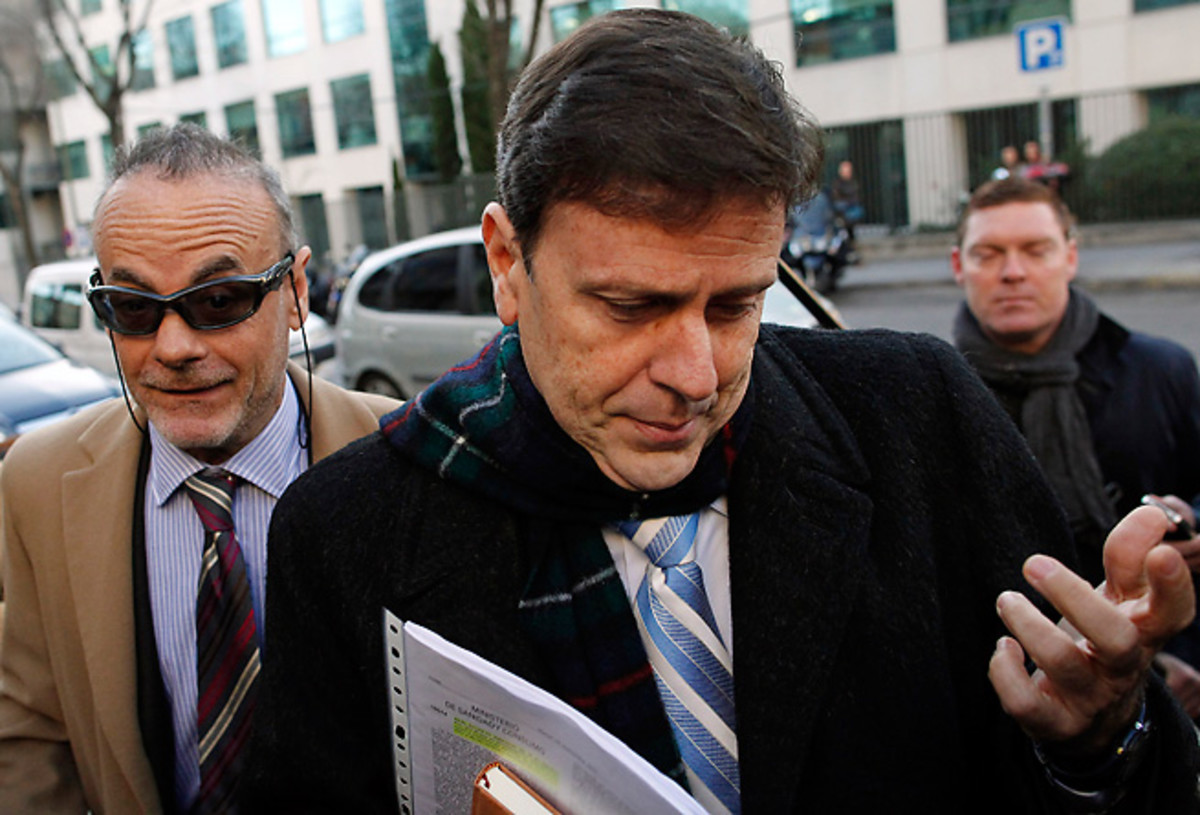IOC, Wada condemn ruling on Operation Puerto blood bags

Dr. Eufemiano Fuentes was found guilty of endangering public health and sentenced to one year.
Andres Kudacki/AP
LONDON (AP) Olympic and anti-doping officials condemned a Spanish court's decision to destroy the blood bags seized in the Operation Puerto case, saying it undermines efforts to catch the cheaters and uncover the full extent of one of the biggest drug scandals in sports.
"It's fundamentally wrong from the point of view of conducting an efficient fight against doping," IOC medical commission chairman Arne Ljungqvist told The Associated Press on Wednesday.
The World Anti-Doping Agency is considering a possible appeal of Tuesday's ruling by Judge Julia Santamaria, who ordered the destruction of more than 200 bags of blood and other evidence gathered in police raids on Spanish doctor Eufemiano Fuentes in 2006.
Santamaria cited Spanish privacy laws for her decision not to turn over the evidence to anti-doping authorities. The ruling, unless overturned on appeal, would prevent officials from identifying the doctor's blood-doping clients and pursuing disciplinary cases against them.
Several prominent cyclists have been identified in the scandal. Fuentes testified he had clients from other sports, including soccer, tennis, boxing and track, but they were not identified.
WADA director general David Howman called the decision "particularly disappointing and unsatisfactory" for the entire anti-doping movement.
"Access to this evidence motivated WADA's involvement in the case," Howman said in a statement. "This would ensure appropriate sports sanction processes against the cheats who used Dr. Fuentes' services."
The Madrid court found Fuentes guilty of endangering public health and handed him a one-year suspended jail sentence. He was barred from medical practice in sports for four years and ordered to pay a $6,000 fine.
"This goes against the principles of the anti-doping code," Ljungqvist told the AP in a telephone interview. "We've been waiting for the information for years now. Every possibility we have to gain more knowledge as to what has happened and how people behaved is of great importance to us."
More than 50 cyclists were implicated in the Puerto case and several were identified by name as having worked with Fuentes.
Howman said WADA is reviewing the court decision and is in contact with the Spanish anti-doping agency about whether to appeal. The deadline is May 17.
Ana Munoz, head of the Spanish agency, said earlier she would appeal.
"For the Spanish Anti-Doping Agency it is very important to know the whole truth and, with this sentence, we only know a part of the truth," she said.
The International Olympic Committee has long been calling for all the evidence to be turned over.
"It is unfortunate that the evidence used in this proceeding is not now being made available to anti-doping organizations to further the fight against doping," the IOC said in a statement.
The IOC stores doping samples from the Olympics for eight years so they can re-tested when new methods become available.
Several drug cheats from the 2004 Athens Olympics and 2008 Beijing Games have been caught and stripped of medals in IOC retests conducted years later. Under proposals for the new WADA code, the storage period for samples would be extended to 10 years.
Ljungqvist, who is also a vice president of WADA, said the Puerto case will be addressed at the next WADA executive committee meeting in Montreal on May 11.
The decision to destroy the blood samples also drew criticism in Britain from the chief executive of UK Anti-Doping.
"Dr. Fuentes has admitted to having been involved in multiple prohibited doping activities, and linked with multiple unnamed athletes," Andy Parkinson said. "It therefore cannot be right that these names will remain unknown and that no immediate action can be taken by the anti-doping community to protect our clean athletes."
British tennis star Andy Murray, the U.S. Open champion and No. 3-ranked player, expressed outrage on Twitter: "Operation Puerto case is beyond a joke ... biggest coverup in sports history? Why would court order blood bags to be destroyed? (hashtag)coverup."
Spain has been trying to shake its reputation as being soft in the fight against doping. With Madrid bidding to host the 2020 Olympics, the government recently announced that a new anti-doping bill will be submitted to parliament this summer, ahead of the IOC vote in September.
"We understand ... that the Spanish government is moving to approve anti-doping legislation in parliament that would bring Spain in line with the principles of the World Anti-Doping Code and the UNESCO Convention against doping in sport and we express hope that this will lead to greater cooperation with anti-doping organizations in the future," the IOC said.





